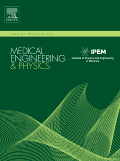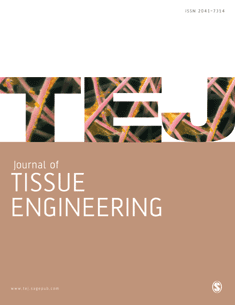
Current Opinion in Biomedical Engineering
Scope & Guideline
Driving progress through critical assessments.
Introduction
Aims and Scopes
- Tissue Engineering and Regenerative Medicine:
The journal publishes research on developing and applying biomaterials, scaffolds, and cellular therapies to regenerate various tissues and organs, exploring approaches to enhance tissue integration and functionality. - Synthetic Biology and Bioengineering:
There is a significant focus on synthetic biology, including the engineering of proteins, genetic circuits, and cellular systems to create novel therapeutic strategies and improve existing biomedical technologies. - Computational Modeling and Simulation:
The journal emphasizes the use of computational methods and models to understand biological processes, simulate complex systems, and predict outcomes in regenerative medicine and biomedical applications. - Biomechanics and Mechanobiology:
Research on the mechanical aspects of biological systems, including how mechanical forces influence cell behavior and tissue development, is a core area of interest. - Biomedical Imaging and Diagnostics:
The journal covers advancements in imaging technologies and diagnostic tools that enhance disease detection, monitoring, and treatment evaluation. - Smart and Intelligent Biomaterials:
Innovative materials that respond to biological stimuli or environmental changes for applications in drug delivery, tissue engineering, and regenerative medicine are a key focus.
Trending and Emerging
- Integration of Artificial Intelligence in Biomedical Applications:
Machine learning and AI are becoming increasingly important in analyzing biomedical data, optimizing designs, and enhancing decision-making processes in various applications, from diagnostics to personalized medicine. - Regenerative Rehabilitation:
This emerging theme focuses on combining rehabilitation techniques with regenerative medicine strategies to improve recovery outcomes, highlighting the importance of functional restoration in tissue engineering. - Point-of-Care Diagnostics and Portable Technologies:
There is a growing interest in developing portable and user-friendly diagnostic devices that enable real-time monitoring and assessment of health conditions, particularly in low-resource settings. - Gene Editing and Synthetic Biology Innovations:
Advancements in gene editing technologies, particularly CRISPR and related methodologies, are rapidly evolving, with significant implications for therapeutic applications and personalized medicine. - Sustainable and Eco-Friendly Biomaterials:
Research is increasingly focused on developing sustainable materials derived from natural sources or waste products, addressing environmental concerns while advancing healthcare technologies. - Interdisciplinary Approaches to Healthcare Challenges:
The trend towards integrating insights and methodologies from various fields, including engineering, biology, and computer science, is gaining prominence, fostering innovative solutions to complex biomedical challenges.
Declining or Waning
- Traditional Biomaterials without Smart Features:
Research centered on conventional biomaterials that do not incorporate smart or responsive properties is becoming less frequent as the field shifts towards more innovative, multifunctional materials. - Basic Laboratory Techniques in Isolation:
Studies focusing solely on traditional laboratory techniques without integration of advanced technologies or interdisciplinary approaches are declining, reflecting a trend towards more complex and integrated research methodologies. - Non-Engineering Approaches to Biomedical Challenges:
There is a noticeable decrease in publications that approach biomedical issues from purely clinical or biological perspectives without engineering solutions, as the journal increasingly emphasizes engineering-driven innovations.
Similar Journals

Tissue Engineering Part B-Reviews
Advancing the Frontiers of Tissue Engineering.Tissue Engineering Part B-Reviews is a premier academic journal published by MARY ANN LIEBERT, INC, focusing on the interdisciplinary field of tissue engineering and regenerative medicine. With an impressive impact factor that places it in the Q1 category across multiple relevant fields—including Biochemistry, Bioengineering, Biomaterials, and Biomedical Engineering—this journal provides a vital platform for researchers and professionals to disseminate cutting-edge findings and comprehensive reviews. Covering a vast scope from 2008 to 2024, the journal is committed to advancing knowledge in the application of engineering principles to biological tissues, making it an indispensable resource for those at the forefront of biomedical innovation. While the journal does not currently offer open access options, its rigorous peer review process ensures high-quality contributions that are essential for academic and practical advancements. The journal's rankings in Scopus reflect its significance, catering to a diverse audience of students, researchers, and practitioners seeking the latest insights in this dynamic field.

ANNALS OF BIOMEDICAL ENGINEERING
Advancing healthcare through engineering innovation.ANNALS OF BIOMEDICAL ENGINEERING is a premier journal in the field of biomedical engineering, published by Springer. Established in 1972, this journal has become a vital resource for researchers, professionals, and students engaged in the rapidly evolving domain of biomedical technology. With a commendable impact factor and ranked in the 76th percentile among its peers as per Scopus, it exemplifies excellence in disseminating critical research findings. The journal covers a broad scope of topics related to the integration of engineering principles with medical and biological sciences, facilitating innovations that enhance healthcare outcomes. Although open access is not offered in this journal, it remains an essential platform for scholarly communication, contributing to the continuous advancement of knowledge in biomedical engineering. ANNALS OF BIOMEDICAL ENGINEERING is not only a bridge for academics to share groundbreaking research but also an influential guide for practical applications in medicine and health technologies, making it a fundamental publication for its readership.

VIEW
Fostering Collaboration for a Healthier Tomorrow.VIEW is a prestigious journal published by WILEY that focuses on the rapidly evolving fields of Biomaterials and Biomedical Engineering. Since its inception in 2020, VIEW has established itself as an open-access platform dedicated to disseminating high-quality research and innovation within these disciplines. With an impressive impact factor that places it in the Q1 category of both Biomaterials and Biomedical Engineering, VIEW ranks among the top journals in its field, boasting a 91st percentile ranking in Biomedical Engineering and an 85th percentile ranking in Materials Science. Researchers, professionals, and students are encouraged to utilize this invaluable resource, as it provides a comprehensive view of current advancements and future trends in biomaterial science and engineering. Positioned in the United Kingdom, VIEW operates as a vital scholarly communication link, fostering collaboration and knowledge sharing within an ever-growing global community.

Frontiers in Bioengineering and Biotechnology
Pioneering Innovations for a Sustainable FutureFrontiers in Bioengineering and Biotechnology, published by FRONTIERS MEDIA SA in Switzerland, stands as a leading platform for innovative research and developments in the fields of bioengineering and biotechnology. Since its inception in 2013, this Open Access journal has garnered significant recognition, reflected in its impressive category rankings: Q1 in Biomedical Engineering and Q2 in Bioengineering, Biotechnology, and Histology for 2023. With a focus on fostering collaboration and knowledge sharing, it aims to provide researchers, professionals, and students with access to pioneering studies that push the boundaries of science and technology. The journal, which is indexed in prominent databases, boasts high visibility and impact, evidenced by its impressive rankings across various categories in Scopus. As it continues to converge from 2013 to 2024, Frontiers in Bioengineering and Biotechnology is dedicated to shaping the discourse in its field and promoting advancements that have the potential to transform healthcare and environmental sustainability.

Annual Review of Biomedical Engineering
Exploring Breakthroughs at the Intersection of Engineering and MedicineAnnual Review of Biomedical Engineering, published by Annual Reviews, stands as a leading academic journal dedicated to the rapidly evolving field of biomedical engineering. With an impressive impact factor that reflects its high citation rates and rigorous peer-review process, this journal offers critical insights by synthesizing cutting-edge advancements and applications in both biomedical engineering and miscellaneous medicine. The journal, which is available in both print (ISSN: 1523-9829) and electronic formats (E-ISSN: 1545-4274), serves as an essential resource for researchers, professionals, and students aiming to stay abreast of significant developments and emerging trends. As of 2023, it is recognized in the top tier (Q1) for both Biomedical Engineering and Medicine, showcasing its esteemed position within the academic community, reflected in its high Scopus rankings. Spanning from 1999 to 2024, the Annual Review of Biomedical Engineering continues to catalyze interdisciplinary collaboration and innovation at the intersection of engineering and healthcare.

MEDICAL ENGINEERING & PHYSICS
Transforming Healthcare Through Engineering InsightMEDICAL ENGINEERING & PHYSICS, published by Elsevier Science Ltd, is an esteemed journal in the fields of Biomedical Engineering and Biophysics. With an ISSN of 1350-4533 and an E-ISSN of 1873-4030, it has established itself as a significant resource from its inception in 1994, continuing to deliver pivotal research up to 2024. This journal, categorized in the Q3 quartile for both Biomedical Engineering and Biophysics, holds a respectable position in Scopus rankings, boasting its relevance in the upper echelons of academic inquiry, particularly ranking #75/152 in Biophysics and #158/303 in Biomedical Engineering. Authors and researchers in these dynamic fields will find the journal’s rigorous peer-review process and commitment to publishing high-quality original research invaluable for advancing their work. Although the journal is not open access, it continues to attract submissions that push the boundaries of innovation and application in medical technologies, making it an essential resource for anyone dedicated to the integration of engineering principles with medical sciences.

JOURNAL OF BIOMEDICAL MATERIALS RESEARCH PART A
Transforming biomedical engineering with impactful discoveries.JOURNAL OF BIOMEDICAL MATERIALS RESEARCH PART A, published by WILEY, is a leading journal in the field of biomaterials and biomedical engineering, showcasing cutting-edge research that bridges the gap between material science and healthcare applications. With a robust 2023 impact factor reflecting its high-quality contributions, this journal is classified in the Q2 quartile for Biomaterials, Biomedical Engineering, and Ceramics and Composites, while achieving an impressive Q1 ranking in Metals and Alloys. The journal caters to a diverse readership, including researchers, professionals, and students, aiming to facilitate innovation and advancements in biocompatible materials and their applications in medical devices and tissue engineering. Access options for readers are available, ensuring the latest studies and findings are readily accessible to all stakeholders in this dynamic field. As it progresses towards its 2024 target, the JOURNAL OF BIOMEDICAL MATERIALS RESEARCH PART A continues to be an essential resource for anyone involved in the development and application of biomedical materials.

Journal of Tissue Engineering
Unveiling Breakthroughs in Regenerative ScienceThe Journal of Tissue Engineering, published by SAGE Publications Inc., stands at the forefront of innovation in the interdisciplinary fields of biomaterials and biomedical engineering. Established as an open access journal since 2010, it has quickly ascended to a leading position, as evidenced by its impressive rankings in 2023: Q1 in Biomaterials, Q1 in Biomedical Engineering, and Q1 in Medicine (miscellaneous). With a current impact factor that underscores its academic influence, this journal provides a vital platform for researchers, professionals, and students to share groundbreaking discoveries and advancements in tissue engineering and regenerative medicine. Located in the United Kingdom, the journal fosters a global dialogue with its robust publications and rigorous peer-review process, contributing significantly to the enhancement and understanding of complex biological systems. Join the esteemed community of thought leaders and innovators shaping the future of healthcare through the Journal of Tissue Engineering.

International Journal of Biomaterials
Advancing healthcare through innovative biomaterials research.The International Journal of Biomaterials, published by HINDAWI LTD, is a premier platform for disseminating groundbreaking research in the fields of biomaterials and biomedical engineering. With an Open Access approach since 2009, this journal provides unhindered access to innovative studies and applications aimed at advancing medical technologies and improving patient outcomes. Notably ranked in the Q3 category for both Biomaterials and Biomedical Engineering in 2023, it serves as an essential resource for researchers, practitioners, and students alike. The journal's Scopus rankings, including a 49th percentile in Biomedical Engineering and a 40th percentile in Biomaterials, further underscore its growing prominence in the academic community. With contributions spanning from 2011 to 2024, the journal seeks to foster collaborative research and promote developments that enhance the understanding and application of biomaterials in healthcare.

Acta Biomaterialia
Shaping the Landscape of Biomedical InnovationActa Biomaterialia, published by Elsevier Science Ltd, is a leading journal in the fields of biochemistry, biomaterials, biomedical engineering, biotechnology, and molecular biology. With an ISSN of 1742-7061 and an E-ISSN of 1878-7568, this prestigious journal has secured a remarkable position in the academic community, evidenced by its inclusion in the Q1 category across multiple disciplines for 2023. It ranks impressively at #21 in biochemistry, #16 in biomedical engineering, #18 in biotechnology, and #11 in biomaterials, reflecting its high impact and relevance to ongoing research and development. The journal provides a platform for disseminating innovative research and advancements in the design and application of biomaterials, contributing to scientific discussions that propel the field forward. Although it does not currently offer open access options, Acta Biomaterialia continues to attract contributions that advance our understanding of biomaterials and their interactions with biological systems, ensuring that researchers, professionals, and students remain informed about the latest trends and breakthroughs in this rapidly evolving area of study.